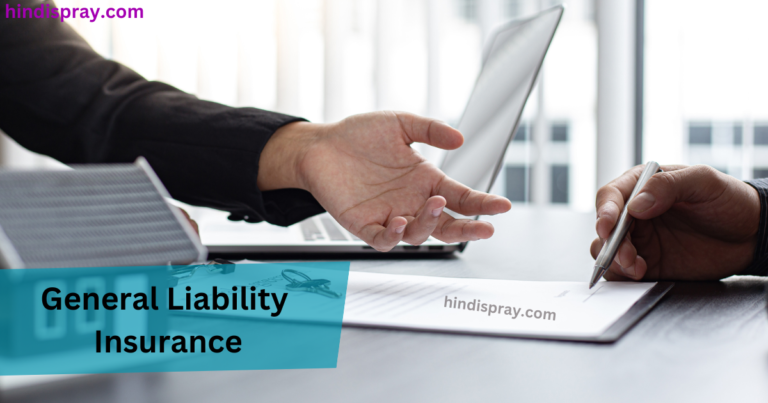Running a business involves numerous risks, from accidents and property damage to legal disputes and unforeseen liabilities. General liability insurance is a crucial tool to safeguard your business from financial losses that could arise from such risks. This type of insurance provides essential coverage, enabling businesses to operate with confidence while minimizing the financial impact of unexpected events.
Key Takeaways :
- Comprehensive Financial Protection: General liability insurance protects businesses from financial losses related to bodily injury, property damage, and personal or advertising injury claims, ensuring stability in the face of unexpected risks.
- Essential for Credibility and Compliance: This coverage enhances your business’s credibility, helps secure contracts, and is often a requirement for working with clients, landlords, or partners.
- Tailored Coverage for Unique Needs: Choosing the right policy involves assessing your business’s specific risks, determining suitable coverage limits, and consulting with experts to ensure adequate protection against liabilities.
What is General Liability Insurance?
General liability insurance is a form of business insurance that protects against claims involving bodily injury, property damage, and personal or advertising injury caused by your business operations, products, or services. It is a foundational policy for businesses of all sizes and is often considered a must-have for entrepreneurs and business owners.
This coverage not only helps pay for damages and legal fees but also demonstrates your commitment to accountability and professionalism, which can enhance your business’s reputation.
Key Features of General Liability Insurance

Understanding the scope of general liability insurance is essential to ensure adequate protection. Key features of this policy include:
- Bodily Injury Coverage: Protects your business from claims arising from injuries sustained by a third party on your premises or due to your operations. For instance, if a customer slips and falls in your store, this coverage can handle medical expenses and legal costs.
- Property Damage Coverage: Covers damages to someone else’s property caused by your business activities. For example, if your employee accidentally damages a client’s equipment during a service visit, this policy will help cover the repair or replacement costs.
- Personal and Advertising Injury: Provides protection against claims of defamation, libel, slander, or copyright infringement related to your advertising efforts.
- Legal Defense Costs: Covers the costs of defending your business in court against covered claims, including attorney fees, court costs, and settlements or judgments.
Why Your Business Needs General Liability Insurance
Businesses face a variety of risks daily, and even a single claim can result in significant financial strain. Here are some compelling reasons to invest in general liability insurance:
- Financial Protection: Legal claims and settlements can be expensive. General liability insurance ensures your business doesn’t have to bear these costs out-of-pocket, preserving your financial stability.
- Compliance Requirements: Many clients, landlords, and partners may require proof of general liability insurance before entering into agreements. Having this coverage can help you secure contracts and leases.
- Enhanced Credibility: Carrying general liability insurance signals to clients and partners that you take your responsibilities seriously and are prepared to address potential risks.
- Peace of Mind: Knowing your business is protected from unforeseen claims allows you to focus on growth and operations without constant worry about potential liabilities.
What General Liability Insurance Does Not Cover
While general liability insurance offers broad protection, it does not cover all risks. Common exclusions include:
- Employee Injuries: Claims related to employee injuries or illnesses are typically covered by workers’ compensation insurance.
- Professional Errors: Mistakes or negligence in professional services require separate coverage, such as professional liability insurance.
- Intentional Acts: Deliberate harm or fraudulent activities are not covered.
- Damage to Your Property: Damage to your business’s own property is usually covered under a commercial property insurance policy.
How to Choose the Right General Liability Insurance

Selecting the right policy involves evaluating your business’s unique risks and requirements. Consider the following steps:
- Assess Your Risks: Identify potential hazards related to your industry, location, and operations. For instance, a construction company faces different risks than an IT consultancy.
- Determine Coverage Limits: Choose policy limits that align with your risk exposure. Higher limits provide more protection but may come with increased premiums.
- Compare Providers: Research different insurance companies and compare their coverage options, premiums, and customer reviews.
- Consult an Expert: Work with an insurance agent or broker to ensure you select a policy tailored to your business’s needs.
Cost of General Liability Insurance
The cost of general liability insurance varies based on several factors, including the size and type of your business, the industry you operate in, your location, and the coverage limits you choose. On average, small businesses pay between $300 and $1,000 annually for a basic policy, though higher-risk industries may face higher premiums.
Tips for Maximizing Your Coverage
To make the most of your general liability insurance:
- Review Your Policy Regularly: Ensure your coverage keeps pace with your business’s growth and evolving risks.
- Implement Risk Management Practices: Reduce the likelihood of claims by maintaining a safe workplace, training employees, and adhering to industry standards.
- Understand Your Policy Details: Familiarize yourself with your policy’s terms, exclusions, and limits to avoid surprises during a claim.
Also Read : Understanding The Importance Of Commercial Auto Insurance For Small Businesses

